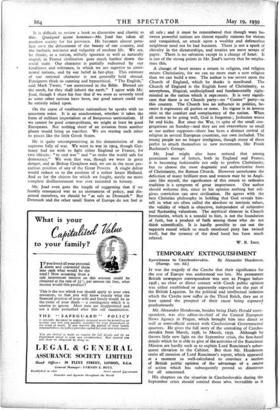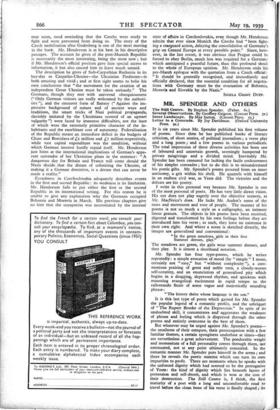TEMPORARY EXTINGUISHMENT
Eyewitness in Czechoslovakia. By Alexander Henderson.
(Harrap. los. 6d.) IT was the tragedy of the Czechs that their significance for the rest of Europe was understood too late. No permanent British newspaper correspondent was sent to Prague before 1938; no close or direct contact with Czech public opinion was either established or apparently expected on the part of the British Legation. In the political and intellectual isolation which the Czechs now suffer in the Third Reich, they are at least spared the prospect of their cause being espoused posthumously.
Mr. Alexander Henderson, besides being Daily Herald corre- spondent, was also editor-in-chief of the Central European News Agency in Prague, which brought him into direct as well as semi-official contact with Czechoslovak Governmental quarters. He gives the full story of the unmaking of Czecho- slovakia from March, 1938, to March, 1939. Although he throws little new light on the September crisis, the first-hand details which he is able to give of the activities of the Runcirnan Mission are hardly such as to explain Lord Runciman's subse- quent elevation to the Cabinet. But then Mr. Henderson omits all mention of Lord Runciman's report, which appeared at a moment so well-calculated to convince a section of British public opinion of the advantage of a course of action which has subsequently proved so disastrous for all concerned.
His chapters on the situation in Czechoslovakia during the September crisis should remind those who, incredible as it may seem, need reminding that the Czechs were ready to fight and were prevented from doing so. The story of the Czech mobilisation after Godesberg is one of the most moving in the book. Mr. Henderson is at his best in his descriptive passages. The account he gives of the post-Munich Republic is necessarily the most interesting, being the most new ; but if Mr. Henderson's official position gave him special access to information, it has also caused him to leave much unsaid.
The description he gives of Sub-Carpathian Ruthenia in its hey-day as Carpatho-Ukraine—the Ukrainian Piedmont—is both amusing and vivid ; and at first sight seems to belie his own conclusions that "the movement for the creation of an independent Great Ukraine must be taken seriously." The Germans, though they met with universal obsequiousness (" Only German visitors are really welcomed by the authori- ties "), and the sincerest form of flattery (" Against the im- pressive background of nature and of ancient ways and traditions, the smart tricks of Nazi political propaganda, slavishly imitated by the Ukrainians seemed of an upstart vulgarity ") were faced by immense difficulties, not the least of which were the extremely primitive character of the in- habitants and the exorbitant cost of autonomy. Federalisation of the Republic meant an immediate deficit in the budgets of Chust and Bratislava of £2 million and £7 million respectively, while vast capital expenditure was the condition, without which German interest hardly repaid itself. Mr. Henderson just hints at the international implications of German's appa- rent surrender of her Ukrainian plans in the sentence : "A dangerous day for Britain and France will come should the Nazis decide that the dream of colonising the Ukraine, of making it a German dominion, is a dream that can never be made a reality."
Eyewitness in Czechoslovakia adequately describes events in the first and second Republic : its weakness is its limitation. Mr. Henderson fails to put either the first or the second Republic in its international setting. For this reason he is unable to give any explanation why the Germans occupied Bohemia and Moravia in March. His previous chapters give no hint that the occupation was necessitated by the internal state of affairs in Czechoslovakia, even though Mr. Henderson admits that ever since Munich the Czechs had "been fight- ing a rearguard action, delaying the consolidation of Germany's grip on Central Europe at every possible point." Since, how- ever, in the last resort, it was obvious that Prague could be forced to obey Berlin, much less was required for a Germany which anticipated a peaceful future, than this profound shock to the whole of European opinion. Mr. Henderson ends his pre-March epilogue with the quotation from a Czech official : "It should be generally recognised, and immediately and officially declared, that the essential condition for all negotia- tions with Germany must be the evacuation of Bohemia, Moravia and Slovalda by the Nazis."
SHIEI-A GRANT DUFF.



















































 Previous page
Previous page